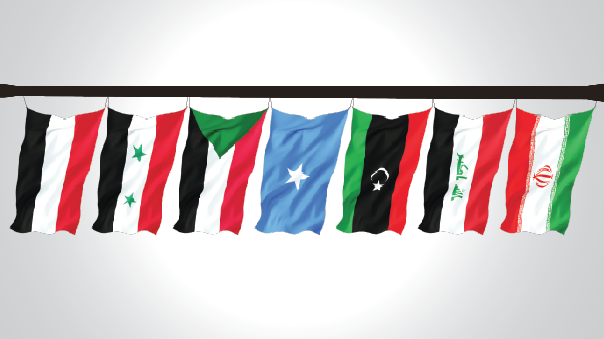Travel ban causes unrest, ambiguity among campus international community
February 15, 2017
A flurry of news, protests and uncertainty has surrounded President Donald Trump’s proposed immigration ban, which includes immigrants and non-immigrants from seven primarily Muslim countries: Iran, Sudan, Syria, Somalia, Yemen, Libya and Iraq.
The ban, which was blocked by a federal appeals court last Thursday, still causes unrest for many international students at South Dakota State, including students from countries not listed, about their futures in the United States.
“The question in their mind is, ‘Am I welcome here?’” said Greg Wymer, director of international students and scholars. “I had one student, he’s actually from Syria, his father said, ‘You need to leave.’ So he’s going to finish up his semester and then he’s transferring to Canada.”
The ban prevented citizens of those seven countries from entering the United States for 90 days, including those who hold green cards or visas. Twenty-nine SDSU students and two faculty members support would have been directly affected by the ban.
Despite the unrest, Wymer said SDSU officials plan to continue reaching out to all international students to help with questions and concerns they may have.
“Our goal is to let them know we care and that we’re here to help them with whatever they need,” Wymer said.
Another show of support came from a solidarity resolution from Students’ Association. The resolution passed unanimously at SA’s Feb. 6 meeting.
“We’re going to show what SDSU stands for,” said Irakoze Naftari, sponsor of the resolution and a foreign exchange student from the Democratic Republic of Congo. “They are a part of our body and we need to take care of each individual part.”
As a student senator, Naftari has heard peers voice concerns regarding the ban. He said some are worried about traveling home for the summer without giving up their education at SDSU, while others are confused with the governing process in a country that is foreign to them.
“It’s surprising, you know, from the United States. Where is the United?” Naftari said.
Along with the SA resolution, President Barry Dunn spoke with Muslim students earlier in the month regarding support from the university through these times. A town hall meeting was held to promote international students as well as diversity in the student body last Wednesday.
Alireza Salehnia, a professor in the Electrical Engineering and Computer Science Department, is a United States citizen originally from Iran. He has heard concern from his Iranian friends and family regarding the ban, as well as from students.
“I had to calm them down and say we had the same situation forty years ago, during the Jimmy Carter era,” he said.
Salehnia was a college student in Oklahoma during the Iranian hostage crisis, which resulted in President Carter issuing a deportation order.
The order required that 50,000 Iranian students report to immigration offices and those who were in violations of terms for their visa were deported, according to Lisa Hager, an assistant professor in political science.
Salehnia said he was told he and his fellow Iranian students would be deported within a month during that time. However, he didn’t get deported.
Looking at the current situation, Salehnia understands the intent of the ban, but believes it is based on the wrong information.
“It’s the president’s job to protect the people,” Salehnia said. “But it [the ban] affects scientists, engineers, doctors — you’ve got the wrong people.”
Though Trump’s ban has been blocked by the judicial branch, allowing citizens of the seven countries to travel to the United States, it is still uncertain what will come long-term from the court’s decision.
Salehnia doesn’t believe the ban is indicative of how most Americans feel.
“American values are ‘all are welcome,’” Salehnia said. “Especially those in need. Go and look at the bottom of the Statue of Liberty,”





















